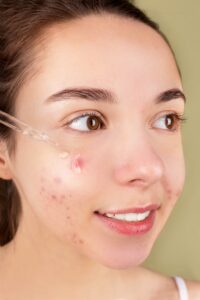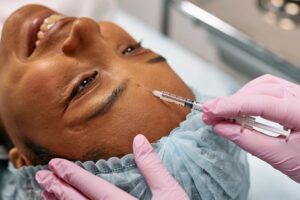A Deep Dive into Effective Scar Treatment

Acne is one of the most common skin problems that people face, and the scars it leaves behind can be just as frustrating. Acne scars can make you feel self-conscious and can be difficult to cover up with makeup. However, there are ways to treat acne scars and reduce their appearance. In this blog post, we’ll explore 5 effective ways to treat acne scars and give you a comprehensive guide on how to get clearer, smoother skin.
-
Chemical Peels
One of the most popular ways to treat acne scars is with a chemical peel. A chemical peel uses a solution that exfoliates the top layer of skin, revealing smoother, more even-toned skin underneath. There are different types of chemical peels, from light to deep, and the type you need will depend on the severity of your scars.
Light chemical peels are great for treating mild acne scars and are typically done in a dermatologist’s office. Deeper chemical peels are best for more severe scarring and may require some downtime for healing.
-
Microneedling
Another effective treatment for acne scars is microneedling. This procedure involves using a device that creates tiny punctures in the skin, which stimulates collagen production and encourages new skin growth. The result is smoother, more even-toned skin.
Microneedling can be done in a dermatologist’s office or at home with a dermaroller. If you choose to do it at home, make sure to follow the instructions carefully and use a high-quality dermaroller.
-
Laser Treatments
Laser treatments are a popular choice for treating acne scars because they’re non-invasive and can be very effective. There are several types of lasers used for acne scar treatment, including fractionated lasers and pulsed dye lasers.
Fractionated lasers work by creating tiny columns of heat in the skin, which stimulate collagen production and encourage new skin growth. Pulsed dye lasers, on the other hand, target the redness in scars and can help reduce their appearance.
-
Topical Treatments
If you’re not ready to try more invasive treatments, there are also many topical treatments that can help reduce the appearance of acne scars. Some of the most effective ingredients to look for in scar-fading products include:
- Retinoids: These vitamin A derivatives can help increase collagen production and speed up cell turnover, which can help fade scars over time.
- Vitamin C: This powerful antioxidant can help brighten skin and reduce the appearance of scars.
- Hydroquinone: This skin-lightening agent can be effective for reducing the appearance of dark scars.
When choosing a topical scar treatment, it’s important to look for products with high-quality ingredients and to follow the instructions carefully.
-
Injectable Fillers
Finally, injectable fillers can be a great option for treating deeper acne scars. Fillers like hyaluronic acid can be injected into the skin to help plump up depressed scars and make them less noticeable.
Injectable fillers are a minimally invasive option for treating scars, but they do require some maintenance. Depending on the type of filler used, you may need to get touch-ups every 6-12 months.

Conclusion
Acne scars can be frustrating, but with the right treatment, they don’t have to be a permanent part of your skin. Chemical peels, microneedling, laser treatments, topical products, and injectable fillers are all effective ways to reduce the appearance of acne scars.
If you’re considering one of these treatments, make sure to do your research and talk to a dermatologist to find out which option is best for your skin type and the severity of your scars. With a little patience and the right treatment plan, you can achieve clearer, smoother skin.

